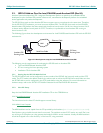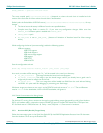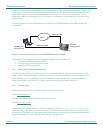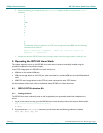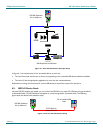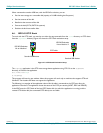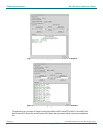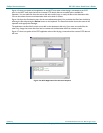
Philips Semiconductors ISP1362 Linux Stack User’s Guide
UM10012-_2 © Koninklijke Philips Electronics N.V. 2003. All rights reserved.
User’s Guide Rev. 1.2—July 2003 18 of 34
• CROSS_COMPILE path
•
MS_SIZE_FLAG is set to _8MB_SIZE_ (because of limitation of Accelent board for Mass storage
demo)
3.3.2.14.OS Image Creation
To compile the kernel and create the final image to be downloaded into the IDP target, use the command:
#cd /usr/src/linux-otg/
#make dep zImage modules modules_install 1362_jffs_rootfs jffs_image
As a result, a number of files starting with "nk_" will be created in the root Linux directory:
•
nk_jffs_flash.bin: This image includes the kernel and root filesystem
•
nk_kernel_flash.bin: This image is just the kernel image, useful if you already have a good root fs
image and just need to reflash the new kernel.
•
nk_kernel.bin : This is an image that will be loaded into RAM from the card without flashing
into ROM. It’s quite useful for debugging or preserving your flash image.
Whichever image you choose to use, copy it to the PCMCIA card and rename it "nk.bin". The card filename
MUST be nk.bin or the bootloader, which is WinCE bootloader, will ignore it.
3.3.2.15.Serial Communication for Debug Output
On the host PC running Linux, minicon can be used to receive debug output (generated by printk) from Accelent
IDP. A null-modem cable is required to connect FFUART(J5) port on Accelent IDP board and a COM port host
PC. Set Baud rate to 115200, data bits = 8, Parity = none, Stop bits = 1, Flow control = hardware.
3.3.3. Accelent IDP Setup
Follow the instructions given in the Quick Start Guide IDP for Intel PXA250 Applications Processor Linux OS document
from the Accelent CD to set up the Accelent IDP.
1. The boot loader boot.bin (from the accelent CD) does not support ISP1362 add-on card. Use the
boot loader from the ISP1362 stack release (/home/1362/AccelentIDP/boot.bin).
2. To load the new kernel and root file system from the development environment, copy the
nk_jffs_flash.bin from the earlier section as nk.bin to the CompactFlash card, and boot up the
Accelent IDP. Follow the instructions on the Quick Start Guide IDP for Intel PXA250 Applications Processor
Linux OS document for detailed loading/booting instructions.
3. Log on to the Accelent IDP as root and execute the following command (This is applicable for the demo
environment setup only)
#cd /home/1362/objs
#./init_setup
This will make the initial setup for the Accelent IDP for ISP1362 Linux stack. Note that you need to
execute this script for the first time only. Connect the Accelent IDP to the Linux host system as a mass
storage device, and perform the following on the host system:
4. Initialize and load the ISP1362 stack on to the target system as mentioned in Section 4.2 and connect the
Accelent IDP to the host Linux PC as a mass storage device.




